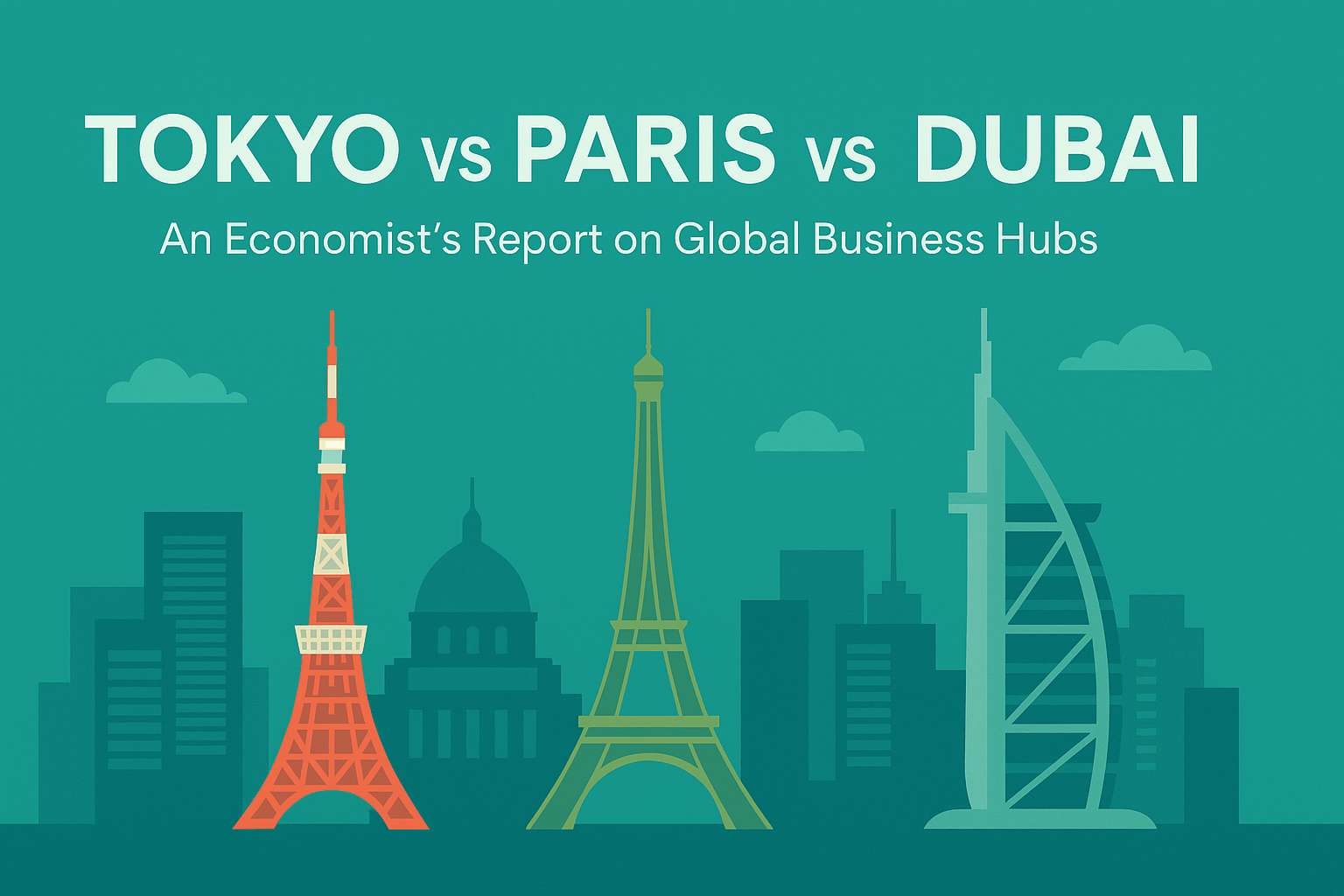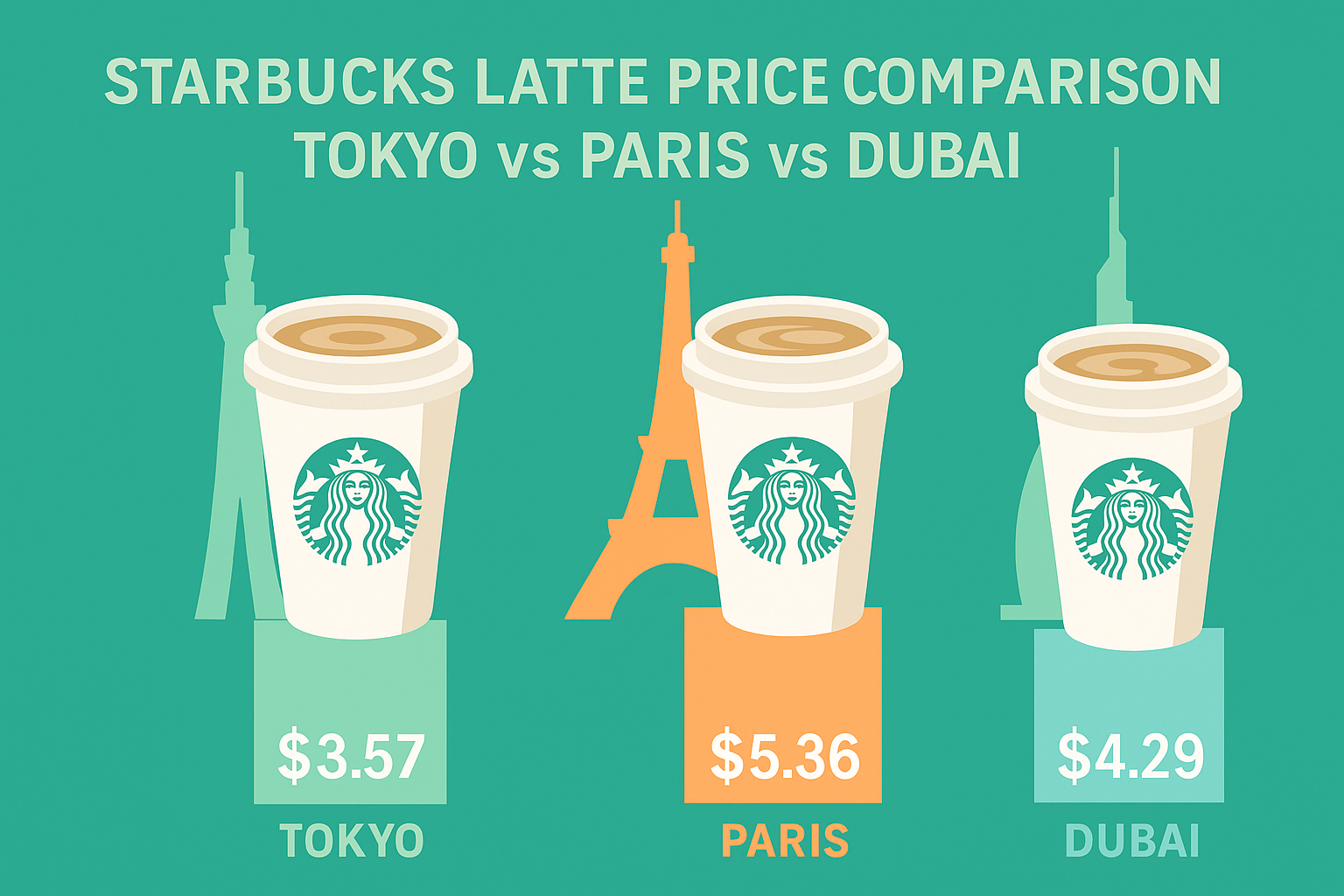—An Economist’s Perspective—
Executive Summary
Tokyo, Paris, and Dubai each represent distinct models of global cities. Tokyo offers deep industrial supply chains and robust capital markets but faces challenges in taxation and language accessibility. Paris is the European Union’s regulatory and innovation hub, with strengths in aerospace, AI, and luxury industries, but constrained by rigid labor and tax systems. Dubai provides unmatched tax efficiency, global connectivity, and flexible residency policies, positioning itself as a magnet for global capital and talent.
Key takeaway: Tokyo excels in R&D and manufacturing collaboration, Paris in EU regulatory and innovation access, and Dubai in global capital mobility and tax efficiency.
1. Financial and Capital Market Presence
- Global Financial Centres Index (GFCI 37, March 2025): Dubai ranked 12th, Paris 17th, Tokyo 22nd. This reflects Dubai’s rapid rise as a financial hub, overtaking traditional centers.
- Dubai’s free zones: DIFC hosts over 7,700 firms (H1 2025), while DMCC surpassed 25,000 member companies, serving as gateways for hedge funds, family offices, and commodity trading.
Implication: For global headquarters or financial operations, Dubai’s tax and regulatory agility is compelling; Paris remains vital for EU compliance and finance, while Tokyo’s stock exchange and domestic corporate base remain critical for Asia-focused capital markets.
2. Accessibility and Geography
- Air hubs:
- Dubai (DXB) handled ~92 million passengers in 2024, consistently among the world’s busiest for international traffic.
- Paris (CDG + ORY) served 103 million passengers in 2024, reinforcing its role as Europe’s main intercontinental gateway.
- Tokyo (HND + NRT) maintains Asia’s largest capacity, ensuring strong North America–Asia connectivity.
- Time zone advantage: Dubai’s location places one-third of the world’s population within four hours’ flight, and two-thirds within eight hours, enabling efficient 24/7 operations.
Implication: Dubai offers unmatched time-zone efficiency for round-the-clock operations; Paris ensures seamless EU access; Tokyo provides the best bridge between Asia and North America.
3. Legal, Tax, and Visa Frameworks
- Corporate tax rates:
- UAE: 9% standard, with 0% on qualifying free zone income.
- France: 25% flat rate since 2022.
- Japan: effective ~29.7% for large corporations (national + local).
- Personal taxation:
- UAE: 0% personal income tax, VAT 5%.
- France: Progressive 0–45%.
- Japan: National income tax up to 45% plus 10% local tax.
- Residency visas:
- UAE: 10-year Golden Visa for investors, entrepreneurs, and skilled talent.
- France: Passeport Talent visa (up to 4 years).
- Japan: Highly Skilled Professional (HSP) visa with point-based benefits.
- Data protection regimes:
- Paris: EU’s GDPR.
- Tokyo: Japan’s APPI.
- Dubai (DIFC): GDPR-aligned Data Protection Law, supporting international business compliance.
Implication: Dubai dominates in tax efficiency and residency flexibility; Paris offers regulatory predictability under EU law; Tokyo provides integration into one of the world’s largest domestic markets.
4. Talent and Innovation Ecosystems
- Global Innovation Index (2024): France 12th, Japan 13th, UAE 32nd.
- English proficiency (EF EPI 2024): France ranked mid-level (49th), Japan low (92nd), UAE moderate with Dubai scoring higher due to expatriate workforce.
- Startup ecosystems: Paris’s Station F is the world’s largest startup campus, hosting 1,000+ ventures. Tokyo remains a powerhouse in robotics, semiconductors, and mobility. Dubai increasingly attracts fintech, logistics, and Web3 startups via specialized free zones.
Implication: Paris and Tokyo lead in advanced R&D and innovation ecosystems, while Dubai excels in commercializing and scaling new industries with regulatory speed and international reach.
5. Cost and Operational Realities
- Tax burden: UAE < France < Japan in corporate and personal tax terms, but UAE’s substance requirements and OECD minimum tax (15%) create compliance needs.
- Operational efficiency: Dubai’s air connectivity and tax regime reduce business frictions; Paris provides EU institutional alignment; Tokyo offers unmatched industrial clustering and supply chain reliability.
6. Purpose-Driven Optimal Choices
- Global HQ, investment & wealth management: Dubai (DIFC) – favored for tax, connectivity, and residency policies.
- EU regulatory industries (AI, fintech, healthcare): Paris – best for EU market access and policy alignment.
- R&D-intensive industries (robotics, semiconductors, advanced manufacturing): Tokyo – ideal for integration with suppliers, researchers, and large domestic corporates.
7. Risks and Challenges
- Dubai: Rising living costs, infrastructure pressure, and compliance with global AML standards.
- Paris: Rigid labor markets, high social security contributions, and language barriers.
- Tokyo: High corporate tax burden, complex regulations, and low English proficiency in the workforce.
Conclusion
Tokyo, Paris, and Dubai represent three complementary global models.
- Tokyo: Industrial depth and capital market strength.
- Paris: EU regulatory and innovation hub.
- Dubai: Global capital and connectivity powerhouse.
For multinational firms, the strategic choice is not singular but combinatorial: front-office capital and investor functions in Dubai, EU regulatory and innovation operations in Paris, and R&D/manufacturing integration in Tokyo. This tri-hub model provides resilience, compliance, and growth synergies across continents.


